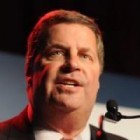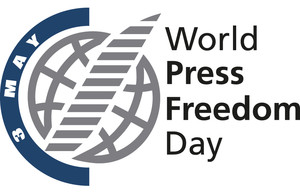NEW YORK, 3 MAY 2019 – Dave Callaway
It’s been seven months since Jamal Khashoggi, a Saudi journalist and dissident, was brutally murdered inside the country’s consulate in Istanbul. His dismembered body has still not been found. The Saudi Royal Family remains the chief suspect.
Yet for globetrotting capitalists in search of opportunity in Riyadh, it’s back to business as usual.
BlackRock founder, Larry Fink, recently told The New York Times he wants to engage the Saudis rather than shun them for whatever internal troubles led to the killing of a respected member of the press and columnist for The Washington Post. Other companies, including Google, Softbank, and HSBC, are also planning business ventures with the Saudis, The Times reported.
On World Press Freedom Day, as more than 250 journalists around the world languish in jails in places such as Turkey, China, and Egypt and hundreds of others risk their lives daily to bring truth to their readers, it’s important to stand up and call this what it is: naked and unabashed greed at the expense of justice.
Signing up for conferences, joint ventures and other deals is not engaging a foreign government to make a difference. These companies, so practiced at wringing the last dollar at the bargaining table, aren’t there to negotiate for the truth tellers. It’s all about the money, and the Saudis know it.
The world is a tough place, they say. But the message that sends to the Saudis is that they can buy their way out of anything, even killing journalists. Other countries, such as the UAE, Russia, or the Philippines, pay heed.
In Myanmar, two Reuters journalists have sat in filthy jail cells for more than 16 months, and face seven-year sentences for their reporting on the massacre of Rohingya Muslims by the country’s government. In the Philippines, crusading journalist Maria Ressa faces jail and bankruptcy for her Rappler news group’s reporting on atrocities by the Duterte government. In Pakistan, Cyril Almeida faces treason charges for his reporting on civil-military tensions. In Mexico, four journalists have been killed already this year, according to the Committee to Protect Journalists.
And in Northern Ireland, 29-year-old Lyra McKee became the first journalist in 18 years to be killed when she was shot in the head during a protest.
The murder recalls an earlier era, a quarter century ago, when terrorists in Ireland, Spain, or even the Middle East kidnapped and shot victims gangland style. Occasional bombings were horrific but rare. These days, terrorists think nothing of video streaming beheadings and coordinating suicide bombings in packed churches on Easter Sunday. Or bringing down jetliners.
Against this ever-increasing spiral of violence, any appeasement or apathy by those who can and should help is a green light to terror and tyranny. Strongmen leaders emboldened by President Trump’s lack of action grow more brazen by the day.
On the front lines of this battle are the brave journalists who strive to report the truth about the violence and corruption in this world. Some pay with their lives. Others sit unjustly in jail. They need our help, not be told the world is tough.
The world’s media is right to highlight these statistics. The world has become less and less of a place for press freedom in the last decade as terror and authoritarianism have grown. Some groups, like CPJ or Reporters Without Borders, or the organization I belong to, the World’s Editors Forum, try to make a difference. But it is an uphill slog.
Still, we’ve had some victories. A campaign in Montenegro to protest government attacks on journalists drew the attention of the U.S. ambassador and for a while helped stifle the violence earlier this year. Safety training in places like Indonesia and Uganda helps journalists learn how to cover natural disasters and large public protests with the latest techniques to avoid violence or accidents.
The rise of interest in the media from a new crop of tech billionaires such as Jeff Bezos and Marc Benioff has funneled money into media at a time when declining business models are hurting great journalism even more than coordinated violence.
But the ability of corporate CEOs and government leaders to fragment the media community by attacking it publicly remains our biggest challenge. Without the confidence and support of the public, we are too small an army. And the losers are ultimately the readers seeking truth, and freedom.
Working together, across news organizations and borders, is the only way forward. Raising funds for support and training. Highlighting injustices when possible. And educating the public about how and why journalists do what they do. These are our goals this World Press Freedom Day.
The next twelve months will no doubt see more horror shows and tales of abuse and harassment of brave journalists. The world is indeed a tough place. If we can work together to stand up for one another, and garner the support of the leaders who have the power to wield influence, even small gains will be worth the risk.
Note to Editors:
 Dave Callaway is President of the World Editors Forum, the leading network for print and digital editors of newspapers and news organisations around the world. It is built on a commitment to defend press freedom and promote editorial excellence. The World Editors Forum is an established network with a 20-year history of connecting editors on issues that matter, and is part of the World Association of Newspapers and News Publishers. More here.
Dave Callaway is President of the World Editors Forum, the leading network for print and digital editors of newspapers and news organisations around the world. It is built on a commitment to defend press freedom and promote editorial excellence. The World Editors Forum is an established network with a 20-year history of connecting editors on issues that matter, and is part of the World Association of Newspapers and News Publishers. More here.
WAN-IFRA is the World Association of Newspapers and News Publishers. Its mission is to protect the rights of journalists and publishers across the world to operate free media and provide its members with professional services to help their business prosper in a digital world and perform their crucial role in open societies. With formal representative status at the United Nations, UNESCO and the Council of Europe, it derives its authority from its global network of leading news publishing companies and technology entrepreneurs, and its legitimacy from its 80 national association members representing 18,000 publications in 120 countries. www.wan-ifra.org
[This article may be reprinted or republished in part or in whole, free of charge, with credit to the author and the source (WAN-IFRA) on or around 3 May 2019, World Press Freedom Day]




